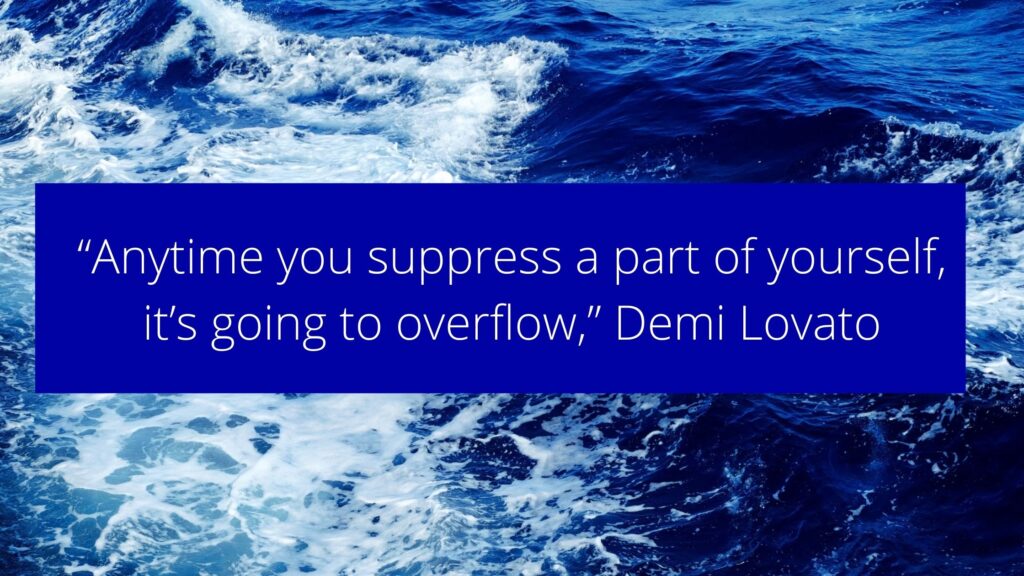Demi Lovato released the first two episodes of her YouTube docuseries “Dancing with the Devil” on March 23, 2021. Two more were released on March 30, and two more will be released on April 5. Releasing the docuseries on YouTube makes it accessible to anyone with an Internet connection and a smartphone or laptop.
“Demi is an honest songwriter. Demi thrives on using her music in a cathartic way,” says her manager Scooter Braun during Dancing with the Devil. Braun’s quote sums up why her songs and performances appeal to me.
Also, Demi Lovato has been a fearless mental health advocate.
What stood out to me after watching the first episode, Episode 1 Demi Lovato: Dancing with the Devil—Losing Control, was that her food choices were handled by others and that her diet looked as if it were designed for overall healthy nutrition and for losing or maintaining weight.
The problem with that is that Demi Lovato has bipolar disorder and could have sugar sensitivity, a sensitive endocrinological system, and a need for a higher percentage of healthy fat in her diet than the average person.
Even mild symptoms of bipolar disorder, such as irritability, negative self-talk, second guessing, and inability to focus, make you feel like crap.
Feeling like crap can trigger relapse.
What isn’t talked about enough is the role that nutrition can play in mental health. Eating disorders can be triggered by depression and anxiety, but they can also manifest depression and anxiety.
What isn’t talked about enough is the role that nutrition can play in mental health.
Nutrition an issue in Demi Lovato’s relapse?
Bipolar disorder is tricky. There is a hormonal component that is not entirely understood. Undereating can trigger hypomania.
Dehydration, even slight dehydration, can trigger anxiety and loss of cognitive skills. One can become dehydrated in several ways including drinking lots of caffeine.
Not eating enough healthy fats can lead to irritability.
I learned all of this the hard way. At age 5, grieving the loss of my mother and experiencing physical abuse at the hand of my guardian, I lived on tea and toast one entire summer and emerged looking skeletal.
Sugar saved my life. I ate an entire homemade sponge cake one day and the flip was switched.
In high school, dancing and running track enabled me to get away with binging and making up for it by fasting one day a week and eating 500 to 1,000 calories as necessary on other days to maintain my weight.
Unbeknownst to me, by college at 17, my bouts of undereating and overeating had caught up with me and affected my moods and my functioning.
Days after my 18th birthday and days before being given the option to return home from college to a physically, mentally, and emotionally abusive parent who had sabotaged my studies by cutting off my funds to purchase textbooks or check into a mental hospital, because the college refused to let me, a student on scholarship, leave its premises with my aunt. Before the Internet, there were no online resources to compensate.
This confrontation transpired during one of my crash diets. Most likely, if I hadn’t been running on fumes and so reactive, I would have realized that having turned 18 granted me legal rights to leave with whomever I pleased.
“No One Was Listening “is the chapter depicting those events in my memoir/information guide Intact: Untangle the Web of Bipolar Depression, Addiction, and Trauma. The chapter ends with this poem.
Pain and Rage
Spilling out
Spilling in
Come undone
Again, and again
Pretend it’s not happening
Survive
Numb
Came to believe
That I don’t count
No one listened, no one cared
Be quiet. Carry on.
You’re such a smart girl.
Watching Demi Lovato Live 2020 Grammys “Anyone”, a haunting, stunning performance, and hearing “Anyone’s” lyrics including “Nobody’s listening to me…”, triggered the memory of my entire childhood of experiencing abuse. Although overall, I had an enriching childhood full of diverse experiences and cultures, I was not able to process the abuse and it affected me.
I figured out all the food stuff through my own research. I also had directional dyslexia, which was not revealed until six college majors later. It turns out that had been a huge factor in my struggles with higher-level calculus and organic chemistry.
Mental health and addiction feed off of each other. There are so many factors that influence mental health. I am grateful to the celebrities that use their platforms to promote the integrative treatment of mental health, such as Halsey, Glenn Close, Lady Gaga, Mariah Carey, and Demi Lovato.


Hi. I just read your article in irritability in the bphope email that went out today. I love the idea of having an irritability index. As for nutrition, I have issues with binging on sugar and processed junk when I am not doing well taking care of myself, and it definitely affects my mood. And my mood affects how I am taking care of myself. It’s a a self-perpetuating problem. I agree with you that there is a definite nutritional component to treating my bipolar disorder (as well as ADD). Thanks for the reminder and getting those mental gears in motion.